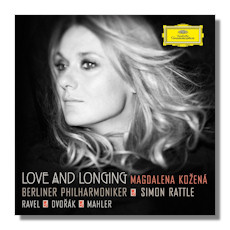
The Internet's Premier Classical Music Source
Related Links
-
Dvořák Reviews
Mahler Reviews
Ravel Reviews - Latest Reviews
- More Reviews
-
By Composer
-
Collections
DVD & Blu-ray
Books
Concert Reviews
Articles/Interviews
Software
Audio
Search Amazon
Recommended Links
Site News
 CD Review
CD Review
Love and Longing

- Antonín Dvořák: Biblical Songs
- Maurice Ravel: Shéhérazade
- Gustav Mahler: 5 Rückert-Lieder
Magdalena Kožená, mezzo-soprano
Berlin Philharmonic Orchestra/Simon Rattle
Deutsche Grammophon 4790065 64:13
Summary for the Busy Executive: Great repertoire, middling performances.
The orchestral song cycle had its roots in the Classical-era concert aria – that is, a song in operatic style, but not part of a particular opera, and with a text delineating a stock situation, like the maid abandoned. In the Romantic period, this somehow crossed with the Lied. In other words, the texts usually got better and the range of subjects and the musical style widened. Liszt arranged Schubert Lieder for orchestra. Brahms made significant contributions with his Alto Rhapsody and Schicksalslied. Wagner orchestrated some of his Wesendonk-Lieder, and Mussorgsky orchestrated a few of his own songs. However, Mahler took to the orchestral song in a big way, orchestrating his individual Lieder (Des Knaben Wunderhorn), cycles (Lieder eines fahrenden Gesellen, Kindertotenlieder), and creating the song-symphony (Das Lied von der Erde).
In a way, the Dvořák Biblical Songs are a bit of a scam, since Dvořák never orchestrated them. On this disc, we hear the arrangements of Vilém Zemánek. They're good but don't sound to me much like Dvořák's orchestra. I prefer the original version for voice and piano. Dvořák sets Czech versions of ten Psalms. There's a sturdy, naïveté to all these songs, directly communicative and refreshing.
With Ravel's Shéhérazade, we leave traditional song behind. They don't resemble folksong, Lied, chanson, or mélodie. They most resemble in their method something like Debussy's La demoiselle élue, a French take on Wagner's "endless melody." Ravel sets verses by the poet known as "Tristan Klingsor," another connection to Wagner. The music is lush and gorgeous and gives the illusion of stasis, an evocation of the rich, languorous Orient, with a bit of harmless decadence tossed in. In general, the fin de siècle types had very tame ideas of decadence, as if they were playing a game. The shock value has definitely faded. The text of "L'indifferent" intrigued me the most with its description of a "feminine" man gliding by a doorway and rousing the passion of the speaker. I immediately wonder about the gender of that speaker.
Mahler originally didn't conceive of his Rückert-Lieder as a cycle, as evidenced by the fact that singers tend to perform them according to their own ideas of order. He orchestrated them from the first versions for piano and voice. However, you can hear motives from one song cropping up in another, which argues that perhaps Mahler changed his mind. Among his most affecting, these songs take on the big topics, or at least Mahler does so. Friedrich Rückert's "Ich atmet einen linden Duft" (linde a play on the German words for "gentle" and "lime tree") becomes with Mahler's music a meditation on the wonder of love. Every song is a beautiful winner, and they range from the dark of "Um Mitternacht" to the unalloyed radiance of "Liebst du um Schönheit" to the translimbic "Ich bin der Welt abhanden gekommen."
For a live recording, this disc astonished me for beauty of sound and clarity of ensemble. Of course, it's the Berlin Philharmonic, one of the world's great orchestras, so I should have expected something this good. However, mezzo Magdalena Kožená keeps me from recommending it whole-heartedly, not that she isn't excellent. I disagree with her approach, that of an opera singer, rather than a Lieder singer. Her dynamic range is rather constricted. She tends to push everything emotionally. She does best in Shéhérazade, where she competes with the orchestra in terms of variety of color. Her "Asie" easily stands at the front of other performances. As I say, she's excellent, but for me that's not enough. I want magic, especially in the Mahler, and I get it in Janet Baker and Sir John Barbirolli's recording (EMI CDC747793-2).
Copyright © 2014, Steve Schwartz




















